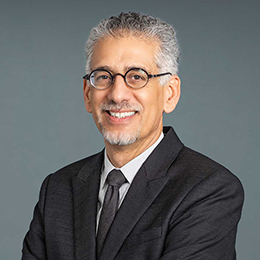With $31 million in funding from the NIH, the Optimal Aging Institute at NYU Langone Health will continue its large, diverse cohort study investigating how vascular risk factors contribute to dementia and other age-related disorders.
Research on aging is becoming more critical, given that the number of adults older than 65 is set to exceed the number of children under 18 in the United States by 2034.
“As human life expectancy increases, there is an urgent need to better understand risk among people aged 85 or older and discover biomarkers that may explain the changing risk associations at an older age.”
Josef Coresh, MD, PhD
“We are grateful for the opportunity to continue gathering rigorous evidence regarding modifiable risk factors in midlife and in older age that may improve dementia prevention efforts and health among even the most elderly adults,” says Josef Coresh, MD, PhD, founding director of the institute.
The research is at the core of the Optimal Aging Institute’s mission of building a hub that connects world-leading, cross-disciplinary research teams dedicated to improving how people age. The goal of the institute, formed in 2023, is to catalyze studies that move from observational epidemiology to biobanking, biomarker discovery, molecular research, and clinical trials that inform risk factor prediction, prevention, intervention, and policy changes.
The ARIC-NCS Study
The cohort study, known as the Atherosclerosis Risk in Communities–Neurocognitive Study (ARIC-NCS), is one of the longest-running cardiovascular studies and includes the longest followed group of Black participants for cognition.
Dr. Coresh co-leads the ARIC-NCS alongside Dr. Thomas Mosley, director of the Memory Impairment and Neurodegenerative Dementia (MIND) Center at the University of Mississippi Medical Center, and Dr. Rebecca Gottesman, chief of the Stroke, Cognition, and Neuroepidemiology Section at the National Institute of Neurological Disorders and Stroke.
For more than 35 years, the project has tracked 15,792 individuals in four communities in Maryland, North Carolina, Mississippi, and Minnesota. The study has spurred numerous publications and is connected to over 2 million biobanked specimens. At the time of enrollment, individuals were between the ages of 45 and 65.
Findings from the study have revealed that midlife vascular risk factors strongly predict dementia, frailty, and cognitive and physical decline occurring before age 85. Yet only cognitive status and physical function reliably predict dementia after 85, raising the need to better understand risk among the oldest group of old adults.
“As human life expectancy increases, there is an urgent need to better understand risk among people aged 85 or older and discover biomarkers that may explain the changing risk associations at an older age for a wide range of diseases,” says Dr. Coresh.
A Focus on Adults 85 and Over
As part of the funding renewal, Dr. Coresh (who has been working with ARIC since 2002) and a team of investigators from 10 universities across the United States will follow approximately 4,000 of the original participants who remain active in the study and who are in their 80s and 90s—building on almost 40 years’ worth of health-related and biomarker data to be related with cognitive function, physical decline, and age-related disease.
The renewal will broaden the scope of data collection by incorporating six types of wearable devices, allowing for the monitoring of sleep, physical activity, blood glucose, and heart health.
“The core principle of the Optimal Aging Institute is that aging-associated declines are not inevitable and should not be accepted as a normal part of aging.”
Emphasis will be placed on race- and sex-specific analyses to better understand how underlying multimorbidity, vascular risk factors, and social determinants of health influence not only biomarker levels but also the timing of their alteration and impact on dementia. Of the participants who remain active in the study, 70 percent are female and 25 percent are Black.
“The core principle of the Optimal Aging Institute is that aging-associated declines are not inevitable and should not be accepted as a normal part of aging,” says Dr. Coresh.
On April 15, Dr. Coresh will moderate a special symposium to highlight an important topic at the intersection of vascular health and aging: “Controversies in Population Health: Tight blood pressure control—can we prevent dementia among older adults?”
The event, co-sponsored by NYU Langone’s Department of Population Health and the Optimal Aging Institute, will feature six renowned experts in the field and will showcase recent groundbreaking research on how treating hypertension may prevent dementia. The discussion is open to the public, but registration is required.






